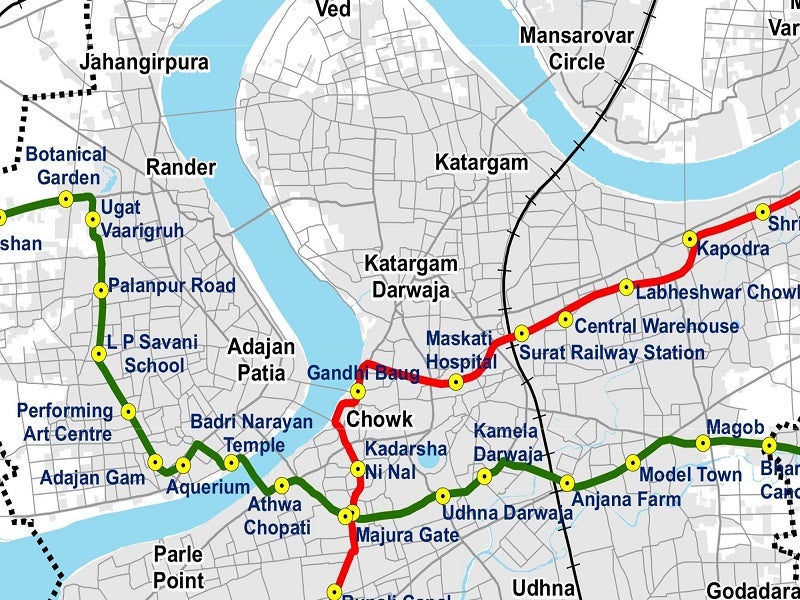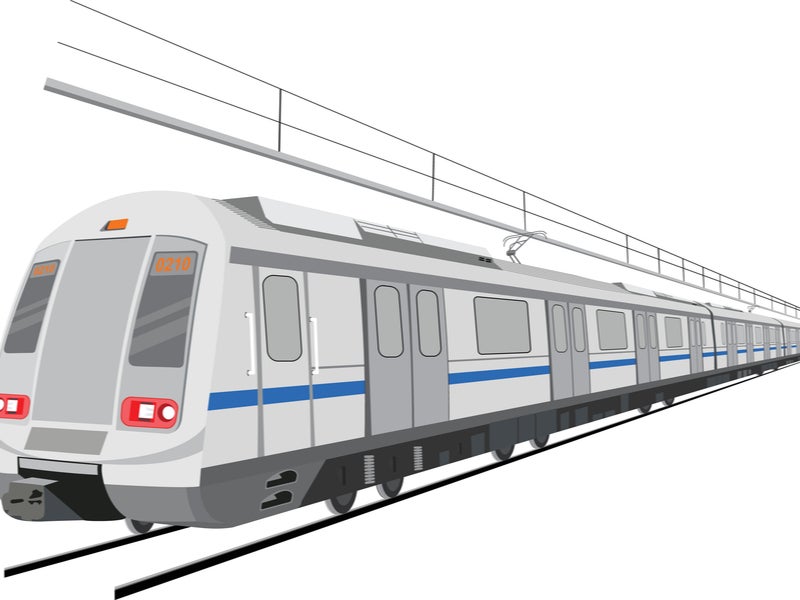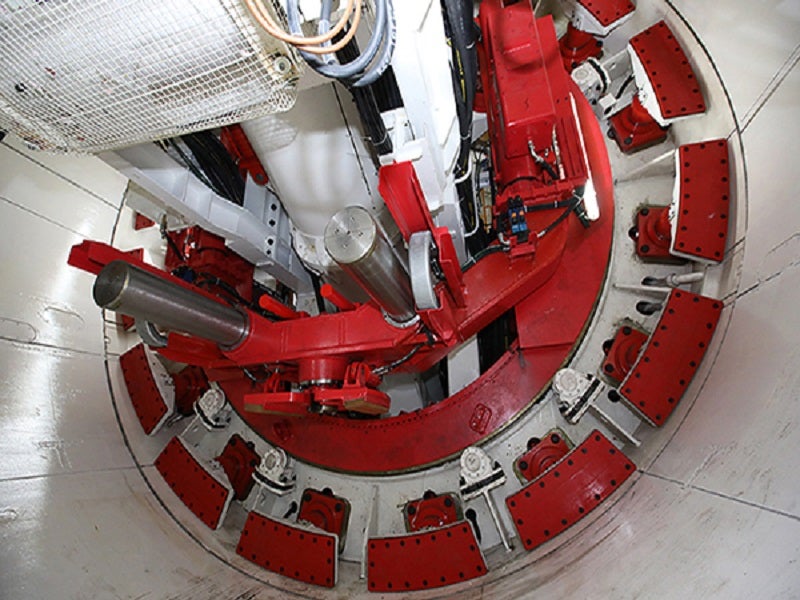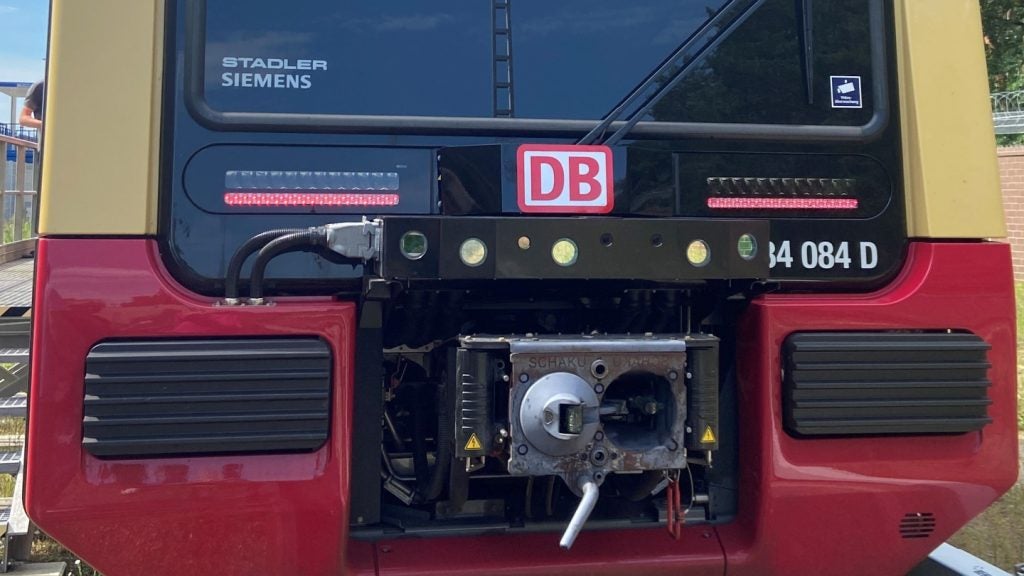Surat Metro rail is a mass rapid transit system being constructed in the state of Gujarat, India.
The Government of India approved the Surat Metro project in March 2019. Gujarat Metro Rail Corporation (GMRC), a special-purpose vehicle jointly owned by the governments of India and Gujarat, is responsible for the implementation of the project.
Delhi Metro Rail Corporation was engaged to prepare the detailed project report (DPR) for the first phase of Surat Metro in January 2016. It later reviewed and revised the DPR to incorporate new provisions, as per the new 2017 metro policy of the Indian government.
The foundation stone for the new metro rail project was laid in January 2021 while completion is expected by March 2025. The project is estimated to involve an investment of Rs120.2bn ($1.71bn).
The integrated mass public transit system is expected to reduce accidents, address traffic congestion problems, and reduce delays on major travel corridors and pollution while decreasing energy usage. It is expected to offset 40,000t of carbon dioxide emissions.
Surat Metro line routes and stations
The 40.35km-long first phase of the Surat Metro will feature 38 stations across two corridors. The plan includes 32 elevated stations and six underground stations.
The first corridor is proposed to be 21.61km long, including a 15.14km-long elevated section and a 6.47km-long underground section. It will run from Sarthana to Dream City, whereas the 18.74km-long, entirely elevated second corridor will run from Bhesan to Saroli.
The first corridor will have 20 metro stations, linking Sarthana, Nature Park, Kapodra, the Labheshwar Chowk area, Central Warehouse, Surat, Maskati Hospital, Gandhi Baug, Majura Gate, Roopali Canal and Dream City.
Stations at Bhesan, Ugat Vaarigruh, Palanpur Road, LP Savani School, Adajan Gam, Aquarium, Majuragate, Kamela Darwaza, Magob and Saroli will be connected through the second corridor. The Majura Gate station will serve as the interchange for the two corridors.
The planned corridors will have multi-modal integration of the metro rail with other modes of transportation including feeder buses, intermediate public transport and non-motorised transport. The corridors will connect the city’s most congested, significant and densely populated areas.
Surat Metro infrastructure
Surat Metro will have a 1,435mm standard gauge track for both corridors which will support operations at a maximum speed of 80km/h and a design speed of 90km/h.
The ticketing system will feature an automatic fare collection system comprising a computerised contactless smart token for a single journey and contactless smart cards for multiple journeys along the route.
It will feature an integrated telecommunication system comprising fibre optic cable, train radio, supervisory control and data acquisition (SCADA) and a public address system.
The signalling system will comprise continuous automatic train control, with cab signalling and an automatic train operation system. Automatic train supervision equipment will be installed to enhance operational safety.
Surat Metro rolling stock
Trainsets with stainless steel-car bodies are being considered for the metro project, according to the DPR. The preferred configuration is three-car trains and each train is expected to have a carrying capacity of approximately 764 passengers, comprising 136 seated passengers and 628 standing passengers.
The trains will be outfitted with train-based monitor and control systems such as train control and management system, or train-integrated management system.
The maximum operating speed of the trains is 80km/h.
Surat Metro maintenance facilities
The first phase will have two maintenance depots, one in each corridor at Dream City and Bhesan. Solar equipment will be installed at the depots to harness solar energy.
Financing for Surat Metro
The project will be financed primarily through equity from the governments of India and the Gujarat state on a 50:50 basis. Part of the financing will be secured through loans from bilateral/multilateral agencies.
The federal government signed a loan agreement worth €442.26m ($500.13m) with Kreditanstalt für Wiederaufbau Development Bank for the project in December 2021.
A loan agreement worth €250m ($303.16m) was signed between the Indian government and the French Development Agency, Agence Française de Développement, for the metro project in January 2021.
Contractors involved
Rail Vikas Nigam, a special purpose vehicle involved in development projects, in consortium with technology company Siemens, will supply and commission a power supply receiving and distribution system for phase one of the project under a Rs6.73bn ($82.62m) contract awarded in April 2023.
HFCL, an optical fibre and optical cable manufacturer, was awarded a Rs2.82bn ($34.36m) contract for the design, supply, installation and commissioning of telecommunication systems for phase one of the project in March 2023.
GMRC signed a letter of acceptance with the Rail Vikas Nigam – ISC Projects JV in January 2023 for the design, supply, installation and commissioning of ballastless track from Sarthana to Dream City of the project under a contract worth Rs1.66bn ($20.08m). The JV will also supply ballasted/ballastless/embedded standard gauge track for corridor one.
Dilip Buildcon, a construction company, was awarded a contract for package CS-06 of the project in July 2022. The scope of the package includes the construction of an 8.702km elevated viaduct and seven stations between Majura Gate to Saroli.
Dilip Buildcon in consortium with construction company Ranjit Buildcon was also awarded the contract for package CS-05 involving the construction of a 10.559km elevated viaduct and corridor.
A consortium of engineering consulting firm Ardanuy Ingenieria and engineering consultancy Rail India Technical and Economic Service (RITES) was appointed to provide detailed design consultation services for the power supply and distribution system, 750V DC third rail traction electrification and SCADA system, in 2020.
A consortium of RITES and Rina Consulting, an engineering and consultancy services provider, was engaged to provide consulting services for the development of a multi-modal integration plan for both corridors, in 2020.
RITES also prepared the environmental impact assessment and social impact assessment documents for phase one of the Surat Metro.
Rina Consulting was also awarded the tender for the contract to provide detailed-design consultancy services for environment simulation studies and tunnel ventilation system of the underground section of phase one in 2021.
In August 2021, consulting and engineering firm SYSTRA, in partnership with joint venture (JV) partners EGIS Rail, a consulting and construction engineering services provider and consulting firm AECOM received a contract to conduct a DPR review and design review, as well as procurement support and construction supervision for civil and system works.
In addition, the contractual scope covers system integration, project management and other services such as safety and quality inspection, testing and commissioning. SYSTRA is the lead partner of the JV.
J Kumar Infraprojects, a civil engineering company, was awarded the package for the construction of the underground section between the Surat railway station and the Chowk Bazar ramp. The contractual scope includes the design, construction and completion of the underground stations and tunnels. A twin-bore underground tunnel is being installed and the package includes three underground stations, namely Chowk Bazar, Maskati Hospital and Surat railway station.
A JV between construction companies Sadbhav Engineering and SP Singla Constructions was awarded a contract to construct an 11.6km-long elevated viaduct between Kadarsha Ni Nal and Dream City, including a ramp for depot access near Dream City and ten stations.
Gulermak-SAM India Builtwell JV was contracted for the design, construction and completion of underground stations and tunnels between the Kapodra ramp and the Surat railway station.
ITD Cementation India, a construction company, was awarded a tender for the development and construction of the Dream City depot, Metro Bhavan building and operations control centre in June 2021.
Australia-based TERRATEC, a designer and manufacturer of tunnel boring machines (TBMs), was engaged to supply earth pressure balance TBMs for phase one of the Surat Metro rail project. All four Earth Pressure Balance Tunnel Boring Machines (EPB TBMs) orders for the rail project are secured. Both new and refurbished EPB TBMs are planned to be used for the project.










